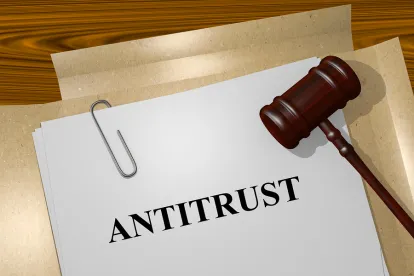On January 3, 2020, Axon Enterprises Inc. filed a complaint against the Federal Trade Commission in the United States District Court for the District of Arizona challenging the constitutionality of the FTC’s administrative process. Axon’s complaint marks the latest salvo in a decades-long critique of the disparity between FTC and Department of Justice merger enforcement procedures.
Background
Axon develops law enforcement technology such as the Taser gun and police body cameras. In May 2018, Axon acquired VieVu, a competing provider of police body cameras. The FTC began investigating the acquisition in June 2018, and filed an administrative complaint on January 3, 2020, alleging that Axon’s acquisition of VieVu eliminated competition and entrenched Axon’s dominant position in the police body camera market.[1] The administrative complaint on its own merits attention, as the FTC does not routinely challenge consummated transactions.
Later that same day, Axon filed its complaint in federal court, alleging that the FTC investigation, administrative complaint, and the FTC’s administrative adjudication process “vest[] the Commission with the powers of prosecutor, judge, and jury in violation of the Due Process and Equal Protection guarantees of the U.S. Constitution.”[2]
FTC and DOJ Merger Enforcement Procedures
The Hart-Scott-Rodino Act (HSR Act) grants the FTC and DOJ the ability to review transactions over a certain size, and challenge those transactions that substantially lessen competition.[3] The FTC and DOJ use a somewhat opaque “clearance process” to identify which agency will investigate a particular transaction on a case-by-case basis.[4]
Although the FTC and DOJ have similar authority to review mergers, the process by which each agency conducts enforcement proceedings differs. The DOJ may only challenge an anticompetitive transaction by filing an injunction in federal court.[5] The FTC may either file an injunction in federal court or initiate an internal enforcement proceeding before an administrative law judge (which the FTC often accompanies with a federal complaint for preliminary injunction).[6]
A responding party subject to the FTC administrative process may either enter into a consent agreement, or may proceed to an adjudicative hearing before an administrative law judge (ALJ) appointed by the FTC.[7] FTC staff also serves as complaint counsel in administrative hearings, filling the role of prosecutor.[8] The adjudicative hearing results in an initial decision by the ALJ, which may only be appealed to the Commission itself.[9] Respondents may ultimately appeal the Commission’s final decision to a U.S. Court of Appeals.[10]
Critique of FTC Merger Enforcement Procedures and the SMARTER Act
Antitrust scholars have long critiqued the disparity between DOJ and FTC merger enforcement procedures – in particular the FTC’s ability to pursue administrative litigation that is not available to the DOJ.
In 2002, Congress established the Antitrust Modernization Commission (AMC) to review the operation and enforcement of U.S. antitrust laws.[11] The AMC issued a report in 2007 recommending that Congress conform FTC and DOJ merger review practices by prohibiting the FTC from pursuing administrative litigation in HSR merger cases.[12]
In 2014, Rep. Blake Farenthold introduced the Standard Merger and Acquisition Reviews Through Equal Rules Act (SMARTER Act) implementing the AMC’s recommendation. Multiple sessions of the House of Representatives have passed the SMARTER Act since 2014, but the Act has never cleared the Senate.[13]
Former FTC Commissioner Joshua Wright supported the SMARTER Act during his tenure at the FTC, arguing that the proposed legislation would ensure procedural fairness by eliminating “application of different legal standards depending upon which agency is assigned to the merger.”[14] Commissioner Wright cautioned that abuse of the FTC administrative process is evidenced by “the fact that over the past two decades, the Commission has almost exclusively ruled in favor of FTC staff. That is, when the ALJ agrees with FTC staff in their role as Complaint Counsel, the Commission affirms liability essentially without fail; when the administrative law judge dares to disagree with FTC staff, the Commission almost universally reverses and finds liability.”[15]
Axon’s complaint echoes Commissioner Wright’s critique: “The fact that only some companies—namely, those that happen to have their mergers investigated by the FTC and not the DOJ—are subject to those unfair procedures only emphasizes their Constitutional infirmity. There is no rational basis for denying companies faced with a merger challenge brought by the FTC of the basic protections they would (and other companies do) enjoy in a merger challenge brought by the DOJ. That is especially so given that the choice of whether a challenge is brought by the DOJ or the FTC is sorted out by the agencies themselves.”[16]
Conclusion
Axon’s complaint against the FTC brings criticism of the FTC administrative process before a judicial forum. A declaration in favor of Axon could effectively result in some of the same changes contemplated by the SMARTER Act, marking a shift in the FTC’s role in challenging HSR transactions, and perhaps conforming procedures between the agencies. Any such changes is likely a long way off, as it is probable the FTC would vigorously oppose any rulings undermining its authority, and appeal any lower court decisions to that effect.
Parties to transactions that trigger HSR review should pay close attention to Axon’s lawsuit against the FTC, and should consult with antitrust counsel for guidance on how to respond to potential changes in the FTC’s use of administrative adjudication.
[1] In the Matter of Axon Enterprise, Inc. and Safariland, LLC, Dkt. No. D9389 (F.T.C. 2020).
[2] Axon v. FTC, et al., Case No. 2:20-cv-00014-DMF, Dkt. No. 1 at ¶ 2 (D. Ariz. Jan. 3, 2020) (Axon Complaint). Axon’s complaint is not the first direct constitutional challenge to the FTC’s administrative process. In 2008, Whole Foods sued the FTC alleging that administrative adjudication of its proposed merger with Wild Oats violated the Due Process Clause. See Whole Foods Market, Inc. v. FTC, Case No. 1:08-cv-02121-PLF, Dkt. No. 1 (D.D.C. Dec. 8, 2008). Whole Foods entered into a consent agreement with the FTC shortly thereafter, and dismissed its case.
[3] 15 U.S.C. § 18a.
[4] How Mergers Are Reviewed, Federal Trade Commission (last accessed Jan. 10, 2020) (How Mergers Are Reviewed).
[5] 15 U.S.C. § 25.
[6] 15 U.S.C. §§ 45(b), 53(b).
[7] 16 C.F.R. § 3.11 (commencement of administrative proceedings); 5 U.S.C. § 3105 (appointment of ALJ).
[8] How Mergers Are Reviewed, supra n. 4.
[9] Id.
[10] 15 U.S.C. § 45(c).
[11] Antitrust Modernization Commission Act of 2002, Pub. L. No. 107-273, 11051-60, 116 Stat. 1856.
[12] Deborah A. Garza et al., Antitrust Modernization Commission: Report and Recommendations at 140 (2007).
[13] SMARTER Act of 2018, H.R. 5645, 115th Cong. (2018).
[14] Joshua Wright, Commissioner, Federal Trade Commission, Remarks at the Global Antitrust Institute Invitational Moot Court Competition (Feb. 21, 2015).
[15] Id; see also, e.g., Richard A. Posner, The Federal Trade Commission, 37 U. Chi. L. Rev. 47 (1969); Rachel E. Barkow, Institutional Design and the Policing of Prosecutors: Lessons From Administrative Law, 61 Stan. L. Rev. 869 (2009); Terry Calvani & Angela M. Diveley, The FTC At 100: A Modest Proposal for Change, 21 Geo. Mason L. Rev. 1169 (2014).
[16] Axon Complaint, supra n. 2 at ¶ 35.




 />i
/>i
